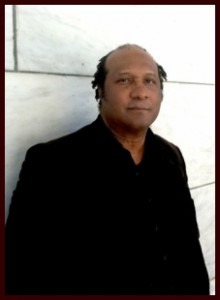 Lewis R. Gordon is an Afro-Jewish philosopher, activist and also a musician, who was born on the island of Jamaica and grew up in the Bronx, New York. Perhaps the finest contemporary scholar who has inherited the Fanonian legacy, Gordon has employed a phenomenological lens of analysis to address fundamental questions about existence in the modern world. Writing with particular sympathies to the experience of those racialized as black, Gordon engages in philosophical inquiry into black existentialism not only to allow his work to serve as a corrective for historical racial injustices, but also because he sees this theoretical line as providing rich terrain through which to search for an answer to philosophy’s fundamental question: “What is a human being?”[1]
Lewis R. Gordon is an Afro-Jewish philosopher, activist and also a musician, who was born on the island of Jamaica and grew up in the Bronx, New York. Perhaps the finest contemporary scholar who has inherited the Fanonian legacy, Gordon has employed a phenomenological lens of analysis to address fundamental questions about existence in the modern world. Writing with particular sympathies to the experience of those racialized as black, Gordon engages in philosophical inquiry into black existentialism not only to allow his work to serve as a corrective for historical racial injustices, but also because he sees this theoretical line as providing rich terrain through which to search for an answer to philosophy’s fundamental question: “What is a human being?”[1]
Over the course of his career, Gordon’s research has crossed the disciplines of Africana philosophy, philosophy of existence, phenomenology, social and political philosophy, and philosophy of science. Recently, Gordon has stretched his repertoire and began to devote attention to problems in the philosophy of physics, especially through a series of on-going discussions and research projects with Stephon Alexander, who teaches physics at Dartmouth College. In addition to theories of social transformation, decolonization, and liberation, Gordon’s research in social and political philosophy also addresses problems of justice and its normative scope.
Gordon’s work has subtly illustrated how the epistemic violence of racialization conditions the possibility of thought itself, following modernity. In particular Gordon’s distinct brand of Africana philosophy offered a potent challenge to the ground on which Eurocentric philosophy self-authorised. For Gordon ‘Africana philosophy is a species of Africana thought, which involves theoretical questions raised by critical engagements with ideas in Africana cultures and their hybrid, mixed, or creolized forms worldwide.’[2]
Furthermore, Gordon’s reach extends beyond the academy; he takes seriously the office of being a public intellectual. Gordon has written for a variety of political forums, newspapers, and magazines such as truthout (on which he now serves as a member of the Board of Directors), the Pambazuka News, the Johannesburg Salon, and The Mail & Guardian, and has lectured across the globe, founded and co-founded book series, journals and organizations, including, with Paget Henry, the past Routledge series Africana Thought and, with his wife, Jane Anna Gordon, the Rowman & Littlefield International series Global Critical Caribbean Thought, the journal Radical Philosophy Review and the Caribbean Philosophical Association, of which he was the first president.
Essential Reading:
Gordon, Lewis 1995. Fanon and the Crisis of European Man: An Essay on Philosophy and the Human Sciences (Routledge)
Gordon, Lewis 1997. Her Majesty’s Other Children: Sketches of Racism from a Neocolonial World (Rowman & Littlefield)
Gordon, Lewis 2003. A Philosophical Account of Africana Studies: an interview with Lewis Gordon. Linda Martín Alcoff (Nepantla: Views from South 4.1)
Gordon, Lewis 2006. Disciplinary Decadence: Living Thought in Trying Times (Paradigm Publishers)
Further Reading:
Gordon, Lewis 1999. Bad Faith and Antiblack Racism (Humanity Books)
Gordon, Lewis 2000. Existentia Africana: Understanding Africana Existential Thought (Routledge)
Gordon, Lewis 2008. An Introduction to Africana Philosophy (Cambridge University Press)
Gordon, Lewis 2015. What Fanon Said: A Philosophical Introduction to His Life and Thought (Fordham University Press)
Questions
What does Gordon ask us to consider when he describes race as the ‘theodicy of modernity’?[3]
Discuss the relationship between Africana philosophy and traditional post-colonial philosophy.
How does Gordon, and Africana philosophy more generally, fit in with the decolonial school of Latin America?
[1] Lewis R. Gordon; Race, Theodicy, and the Normative Emancipatory Challenges of Blackness, South Atlantic Quarterly, Fall 2013, p.730
[2] Lewis R. Gordon, An Introduction to Africana Philosophy, Cambridge: Cambridge University Press 2008) p.1
[3] Lewis R. Gordon; Race, Theodicy, and the Normative Emancipatory Challenges of Blackness, South Atlantic Quarterly, Fall 2013
Submitted by Kojo Koram